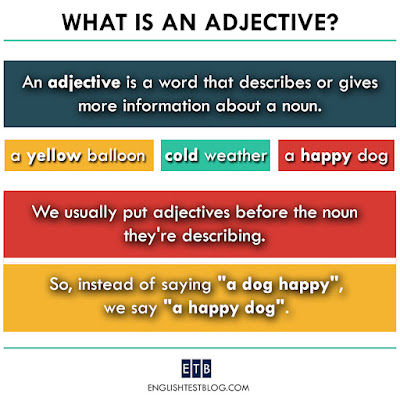Adjectives play an important role in English because they help make our words more interesting and specific. Imagine if we only said "a dog" without any adjectives. We wouldn't know if it's a big dog, a small dog, a friendly dog, or a sleepy dog.
What is an adjective?
An adjective is a word that describes or gives more information about a noun (a person, place, thing, or idea). Adjectives can tell us about the size, color, shape, feeling, or any other quality of the noun. For example, if we say "a happy dog", we get a clearer picture of the dog's mood. If we say "a tall building", we know more about how big the building is.
- a small town
- cold weather
- a yellow balloon
Position
We usually put adjectives before the noun they're describing. So, instead of saying "a dog happy", we say "a happy dog".
- a happy dog
- a blue sky
- delicious soup
When it comes to describing how something seems, feels, smells, tastes, or appears, you might find adjectives following verbs.
- My dog is happy.
- The sky became blue again.
- This soup tastes delicious.
Two or more adjectives together
We can use two or more adjectives together to describe something in more detail. Instead of just using one word to talk about a noun, like saying "a happy dog", we can add another adjective to make it even more specific. like "a happy, playful dog". It is like adding more layers to our description.
- an old historic building
- a long, narrow, plastic brush
- The sky is clear and blue.
Adjective form
Some adjectives have special endings that can help you know more about the noun they're describing. Here are some examples:
- -ful: Adjectives ending in "-ful" often show the presence of something. For instance, "colorful" means full of colors, and "playful" means full of play or fun.
- -less: Adjectives ending in "-less" show the absence of something. "Fearless" means without fear, and "careless" means without care.
- -ous: Adjectives ending in "-ous" are used to describe qualities or characteristics. "Curious" means eager to learn, and "dangerous" means full of danger.
- -able/ible: These endings suggest the possibility or capability of something. "Comfortable" means giving comfort, and "flexible" means capable of bending easily.
It's important to note that many adjectives don't follow a specific pattern, and they might not have a clear ending that gives a hint about their meaning. You have to learn them individually. For example, "fast" describes speed, but it doesn't end in "-ful", "-less", "-our", or "-able".
Comparative and Superlative
Most adjectives can be comparative or superlative.
When we compare two things, we use the comparative form of adjectives. We add "-er" or use "more" before adjectives. For example, fast (adjective) becomes faster (comparative).
When we want to say one thing has the highest or greatest degree of a quality among three or more things, we use the superlative form. We add "-est" or use "most" before the adjective. For example, fast (adjective) becomes fastest (superlative).
- fast, faster, fastest
- big, bigger, biggest
- good, better, best
- expensive, more expensive, most expensive

Comments
Post a Comment